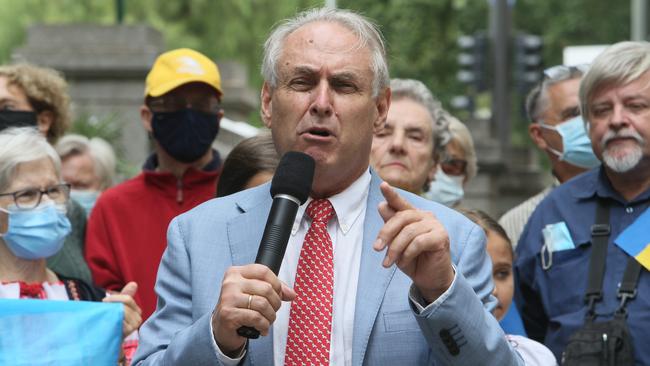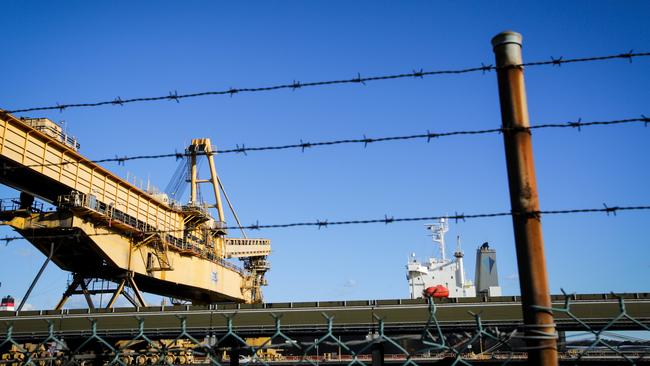China trade thaw as coal, cotton exports resume
Trade tensions with China are easing with coal and cotton exports back on track, but the federal government remains cautious about proclaiming an end to Beijing’s unofficial ban.
A two-year freeze on coal and cotton exports to China appears to have thawed with a lift in the volume of goods being sent to Australia’s biggest trading partner, but the Albanese government remains cautious about proclaiming an end to Beijing’s unofficial ban.
The first shipments of Australian coking coal arrived in a southern Chinese port in early February, and ASX-listed, Chinese-owned coal company Yancoal confirmed this week it had sent two cargoes of coal to China this year.
Some 25 ships with a total of 2.5 million tonnes of Australian coal had sailed for China “since January”, commodity analyst S&P Global told the Australian.
Australian coal sales to China were cut back in 2019 and halted in 2020 by informal bans imposed as a result of political tensions. Two-way trade between Australia and China was worth $300bn last year.
The coal hiatus saw dozens of ships with Australian coal forced to moor off Chinese ports. As many as 80 shipments were believed to be affected.
Australian cotton sales to China had also resumed, with a shipment of several thousand tonnes of cotton arriving in the port of Qingdao “in recent days”, China’s Global Times reported.
Federal Trade Minister Don Farrell said the trade flows were positive for Australian companies but warned the full resumption of exports between the two countries could take some time.
“We welcome any step towards the full resumption of trade” with China, Senator Farrell said. “It is in both countries’ interest for trade impediments to be removed.”
But he warned that “the trade impediments didn’t occur overnight, and they won’t be resolved overnight”.

While more unofficial trade sanctions across a range of products are expected to be lifted this year, ending formal trade sanctions against Australian wine and barley will be more challenging, as both are subject to formal tariffs from China and a federal government appeal to the World Trade Organisation is on foot.
The cotton report said the sale followed “relevant procedures” for the sale, which had begun last December in the wake of a thawing of political relations between Australia and China.
However, the chief executive of Cotton Australia, Adam Kay, told the Australian on Thursday that the Australian cotton industry did not know about any thawing of the “soft ban” on Australian cotton, which was imposed in China in October 2020.
He said the shipment referred to by the Global Times was only small and may have been a product sent to a bonded warehouse in a free-trade zone, which could have come from a third party.
“People are hoping that there might be a thawing of the relationship, but there is no lifting of the ban that we know of,” he said.
China once took as much as 70 per cent of Australian cotton in a trade once worth several billions of dollars a year.
But Mr Kay said Australian cotton producers had been able to sell their product to a range of countries including Vietnam, Thailand, India and Indonesia since the unofficial Chinese trade bans were imposed. He said the ban had only hurt Chinese spinners, which were unable to buy the high-quality Australian product.
“They had to move to lesser qualities from other countries, so I am sure they would love a removal of the soft ban,” he said.
But while the situation with cotton exports is now unclear, the resumption of coal exports to China this year has been confirmed and is gathering momentum.
The Global Times article urged Australia to take further steps to improve the political relationship.
It said Chinese buyers were adopting a “wait and see” attitude towards Australian cotton, citing concerns that “geopolitical clouds hanging over the bilateral relationship have yet to be fully removed”.

S&P Global said the “informal ban” on Australian coal was lifted late last year amid improving political relations.
It said a switch to gas by major coal buyer South Korea could pave the way for more Australian coal to be available for the Chinese market.
As with cotton, the unofficial ban on Australian coal in China has seen Australian exporters step up their sales to other countries.
While the attitude in China has clearly changed this year, S&P Global said it did not expect Australian coal sales to China to return to the levels seen before the political tensions. S&P Global’s Asia-Pacific dry bulk freight pricing editor, Shriram Sivaramakrishnan, said the dry bulk markets would “welcome the sales of Australian coal to China after its absence for more than two years”.
“With LNG prices dropping below $15/mmbtu, there could be an increase in coal-to-gas switching, especially in South Korea, which could make more Australian coal available for China,” he said.
He said the collapse of a coal mine in Inner Mongolia last week and the upcoming Chinese political meetings in March could lead to restrictions on domestic coal production in China, which could see more demand for imported coal. “Overall demand, though, is expected to remain subdued and not reach the volumes seen before the trade dispute,” he said.
“During the hiatus of this trade, China has managed to find other origins to fill in the gap, while Australia has also managed to maintain its export volumes by selling to other destinations.”
Senator Farrell met China’s Minister of Commerce Wang Wentao for the first time, by teleconference, in January – the first meeting of Australian and Chinese trade ministers since 2019.
He has accepted an invitation from Mr Wang to travel to Beijing but no date has been set.
Trade officials from both Australia and China had “constructive” talks last week.







To join the conversation, please log in. Don't have an account? Register
Join the conversation, you are commenting as Logout